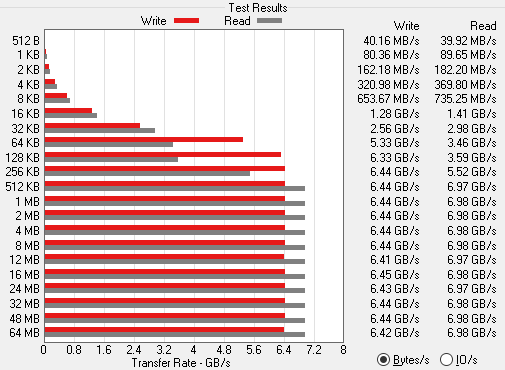The test system used in this review is equipped with an AMD Ryzen 5 3700x CPU, MSI B550 GAMING PLUS motherboard, 16GB (8GB x 2) of Crucial Ballistix 3200 MHz DDR4 memory, Crucial P5 1TB SSD and a GIGABYTE GeForce GTX 1060 WINDFORCE OC 6G graphics card. For the operating system, I used the latest version of Windows 10 Pro.
To test the performance of Samsung's 990 PRO SSD, I ran a series of benchmarks using CrystalDiskMark, HD Tach RW, ATTO Disk Benchmark, AS SSD, HD Tune Pro, Anvil's Storage Utilities, Iometer and PCMark. For comparison, I've also included test results from the ADATA LEGEND 960, Crucial P3 Plus, SK hynix Platinum P41, Silicon Power XS70, WD_BLACK SN770, ADATA XPG ATOM 50, ADATA XPG GAMMIX S70 Blade, Crucial P5 Plus, Plextor M10PY, ADATA XPG GAMMIX S70, Sabrent Rocket 4 Plus, WD_BLACK SN850, Silicon Power US70, ADATA XPG GAMMIX S50 Lite, ADATA Elite SE880, Kingston XS2000, ADATA XPG ATOM 30, Samsung 980, Silicon-Power UD70, Crucial P2, SK hynix Gold P31, Crucial P5, ADATA SWORDFISH, ADATA FALCON, Lexar NM610, Silicon Power P34A60, Patriot P300, Plextor M9PG Plus, Plextor M9PY Plus, Crucial X8, ADATA XPG SX6000 Pro, Western Digital WD_BLACK SN750, Samsung 970 EVO Plus, ADATA XPG SX8200 Pro, Crucial P1, ADATA XPG SX8200, Western Digital WD_BLACK NVMe, Samsung 970 EVO, Samsung 970 PRO, Plextor M9Pe, Plextor M8Se, Patriot Hellfire, ADATA XPG SX8000, Samsung 960 PRO, Toshiba OCZ RD400, Samsung 950 PRO, ADATA Ultimate SU670, Lexar NQ100, Samsung 870 EVO and Samsung 870 QVO.

As I mentioned earlier, the 990 PRO uses Samsung's Pascal controller chip. Looking at the screenshot above, you can see that it performs equally well with both incompressible (0%) and compressible (100%) data.
CrystalDiskMark 8.0.4:
First, I ran a few quick tests using CrystalDiskMark. This benchmark measures the performance of a storage device by testing its sequential and random read and write speeds. For this test, we're using the peak and real world profiles.

According to Samsung, the 2TB version of the 990 PRO is capable of reading at 7,469 MB/s and writing at 6,869 MB/s. While the drive had no problems reaching its rated read speed, it came up a bit short in CrystalDiskMark's sequential write speed test. The most impressive number here, though, is the 990 PRO's sequential transfer rate when using a mixed (read and write) load. With most drives, this number falls somewhere in between the maximum read and write speeds, but in this case, it was faster than when reading alone, reaching a whopping 8,133 MB/s.

As you'd expect, the 990 PRO wasn't as fast when tested with the "real world" profile which uses a single thread and a much lower queue depth. Nevertheless, it was still able to read at 4,154 MB/s and write at more than 5,711 MB/s.
HD Tach RW 3.0.4.0:
Next, I used HD Tach to test the 990 PRO's read, write and burst speeds as well as its random access time and CPU usage.

Looking at the screenshot above, you can see that the 990 PRO had average read and write speeds of 2,730.3 MB/s and 2131.7 MB/s respectively, as well as a burst speed of 2,482.4 MB/s. The screenshot also shows the transition from TurboWrite to what Samsung calls "After TurboWrite" speeds. The 990 PRO starts writing at about 2,600 MB/s and then drops to about 1,800 MB/s when the consecutive write operation exceeds the size of the SLC buffer.
ATTO Disk Benchmark 4.01:
I also used ATTO Disk Benchmark to test the 990 PRO's sequential read and write speeds. The tests are run using blocks ranging in size from 512B to 64 MB and the total length set to 256MB.
When tested with ATTO, the 990 PRO's read speeds topped out at about 6.98 GB/s and its write speeds at 6.44 GB/s.



